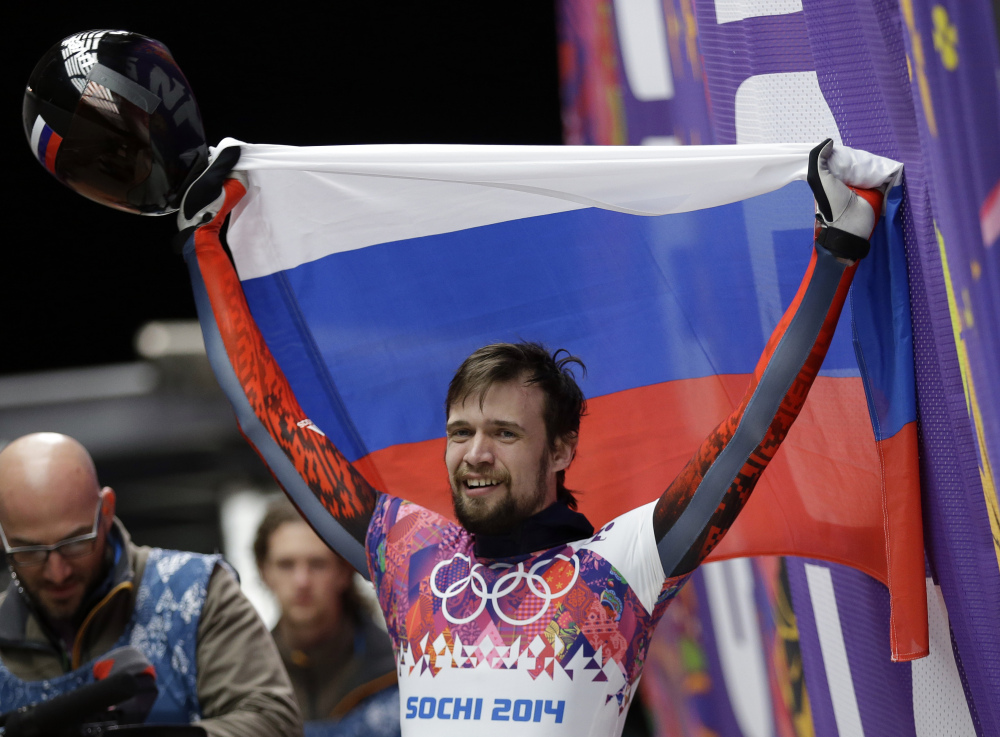KRASNAYA POLYANA, Russia — One year after a giant meteor streaked across Russia’s sky, Alexander Tretiakov flashed by.
Accelerating down his home track lined from top to bottom with flag-waving, chanting countrymen, Tretiakov won the Olympic gold medal in men’s skeleton on Saturday night, blasting away from the world’s top sliders who were no match for his breakneck speed and precise driving.
Tretiakov completed four trips down the Sanki Sliding Center track in 3 minutes, 44.29 seconds, easily beating Latvia’s Martins Dukurs (3:45.10), who settled for silver again after having gold slip from his hands four years ago in Vancouver.
Matt Antoine of Prairie du Chien, Wis., won the bronze, the first skeleton medal for an American man since Jimmy Shea’s gold in 2002. John Daly of Smithtown, N.Y., entered the final run in fourth place, but had his sled jump from the grooves in the starting ramp and dropped all the way to 15th.
With cries of “Ro-ssi-ya, Ro-ssi-ya,” echoing off the mountain and toward the ski resort area down below, Tretiakov won the host nation’s fourth gold of the Sochi Games.
And with his out-of-this-world performance, Tretiakov, the bronze medalist in Vancouver, will receive a unique medal.
On Feb. 15 last year, a giant meteorite zoomed over Russia’s Ural Mountains, causing a sonic boom and exploding over the city of Chelyabinsk. A piece of the space rock was recovered by scientists and Tretiakov’s gold — as well as the other six won on the anniversary — will be embedded with a fragment from the asteroid.
A fitting reward for the “Russian Rocket.”
After two blistering runs on Friday, Tretiakov began the third heat with a 0.56-second lead over Dukurs, who had been reminded of his near miss for gold in Vancouver all week but insisted he would be satisfied with leaving Russia with any medal.
Dukurs led after three runs in Whistler, but the two-time world champion was caught in the final heat by Canada’s Jon Montgomery, who like Tretiakov, had a home-ice advantage and won by 0.07 seconds.
Skeleton’s best slider for several years, Dukurs, who won six of eight World Cup events this season, had learned the hard way that no lead is safe, and nothing’s guaranteed until the last man is down the mountain and across the finish line.
“It’s sports,” Dukurs said. “Anything can happen.”
Tretiakov, though, quickly put to rest any thought of a comeback by Dukurs.
Matching his start record (4.47) for the third consecutive heat, he completed his third run in 56.28 seconds, and as Dukurs waited for his turn to go he had to know deep down that the race was over.
Dukurs, who has won 24 of the past 28 World Cup events, managed to trim 0.02 seconds off Tretiakov’s margin on his third run, but needing to make up more than a half-second on his last descent was asking way too much — even for someone U.S. coach Tuffy Latour said “may go down in the books as the all-time greatest skeleton athlete.”
To prepare for the Sochi Games, Tretiakov skipped the season’s final World Cup event in Konigsee, Germany, so he could get in extra runs on the Sanki course. He figured the extra time on the ice would give him an edge, and he was right. No one could match him as he reached a top speed of 81 mph.
Daly and Antoine, good buddies and Olympic roommates, were separated by just 0.04 seconds after the third heat.
But Daly, perhaps feeling the pressure, was out of the medal picture just steps into his final run. His sled jumped from the right groove and skittered sideways. Daly was able to get his sled straightened out, but by the time he did, the bronze was long gone.
After stopping in the finish area, he buried his head in his hands.
“I knew I had to go for it, so I went for it and it bit me,” he said. “The blame is totally on me.”
Antoine, who had three podium finishes this season, then put together a clean run, finishing in 56.73 seconds to beat Latvia’s Tomass Dukurs, Martins’ brother, for bronze.
Daly and Antoine broke into the sport together, drawn to skeleton for its speed and danger after being inspired by Shea’s storybook win in at the 2002 Salt Lake City Games, when he dedicated his win to his late grandfather, killed a month before the games by a drunken driver.
Send questions/comments to the editors.


